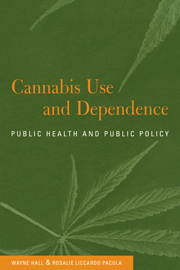Book contents
- Frontmatter
- Dedication
- Contents
- List of figures and tables
- Foreword
- Acknowledgements
- 1 Introduction
- Section 1 Cannabis the drug and how it is used
- Section 2 The health effects of cannabis
- Section 3 The psychological effects of chronic cannabis use
- Section 4 Effects on adolescent development
- Section 5 Harms and benefits of cannabis use
- Section 6 The effectiveness and costs of cannabis prohibition
- Section 7 Policy alternatives
- 17 Variations on prohibition
- 18 Cannabis as a legal substance
- 19 Summing up
- Appendix 1
- Appendix 2
- References
- Index
17 - Variations on prohibition
from Section 7 - Policy alternatives
Published online by Cambridge University Press: 05 July 2016
- Frontmatter
- Dedication
- Contents
- List of figures and tables
- Foreword
- Acknowledgements
- 1 Introduction
- Section 1 Cannabis the drug and how it is used
- Section 2 The health effects of cannabis
- Section 3 The psychological effects of chronic cannabis use
- Section 4 Effects on adolescent development
- Section 5 Harms and benefits of cannabis use
- Section 6 The effectiveness and costs of cannabis prohibition
- Section 7 Policy alternatives
- 17 Variations on prohibition
- 18 Cannabis as a legal substance
- 19 Summing up
- Appendix 1
- Appendix 2
- References
- Index
Summary
Prohibitionist policies towards cannabis use can be grouped into three broad categories: complete prohibition, partial decriminalisation, and full decriminalisation. These three categories (which are defined in detail below) are used to facilitate discussion; they are not necessarily distinctions recognised by law. We recognise that a great deal of confusion has been generated by the imprecise use of the term 'decriminalisation’ in the past, but we think that our use accurately characterises the policy regimes that are usually included under this heading in public debate. It also clearly differentiates different prohibitionist policies.
Complete prohibition
We use the term ‘complete prohibition’ to refer to prohibitionist policies that prohibit the supply of cannabis, impose criminal sanctions on individuals who possess or use any amount of cannabis or any cannabis product. A criminal sanction is one in which a criminal charge, either misdemeanour or felony, is brought against the offender, and a record of the offence is maintained on public record for a specified period of time. Because possession and use offences are criminalised under this model an offender may be imprisoned for a specified period, although jurisdictions may allow some offenders (e.g. first offenders) to avoid imprisonment by participating in a drug treatment, drug education or community service program. The maintenance of a criminal record for all offenders, however, is key because these records have consequences for individuals after they serve their sentence, e.g. adverse effects on their reputation, employment opportunities, travel and housing (Lenton et al., 1999).
There are numerous examples of complete prohibition in developed countries, such as Canada, Sweden and the federal policy of the United States. Most of these policies, however, have only been in effect for a relatively short period of time. Although their policies are nominally similar in their treatment of users and possessors, they differ substantially in the penalties that are imposed. Levels of enforcement also differ across countries. The United States and Sweden provide perhaps the greatest contrast.
- Type
- Chapter
- Information
- Cannabis Use and DependencePublic Health and Public Policy, pp. 187 - 194Publisher: Cambridge University PressPrint publication year: 2002



